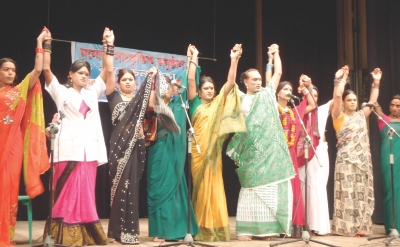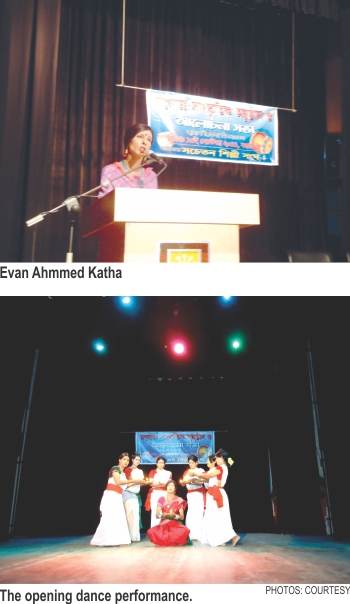| Home - Back Issues - The Team - Contact Us |
 |
| Volume 10 |Issue 36 | September 23, 2011 | |
|
|
Perceptions Unacknowledged Survivors It is the movement across a socially imposed boundary away from an unchosen starting place- rather than any particular destination or mode of transportation that best characterises the concept of “transgender” – ‘Transgender History’ by Susan Stryker. Saad Adnan Khan
Oppression exists in the society disguised as a natural and logical system. The system, which is run by the powerful and privileged, thrives on the idea of dehumanising, marginalising and silencing people who are different from the powerful and privileged. The system of oppression is thus a very cunningly well-planned enterprise that makes it possible for the powerful to practice every form of injustice without the slightest sense of hesitation. Depriving hijras, or transgender people in Bangladesh of equal rights and access to education, job and other basic needs of a human being, on the basis of their identity and labelling them “abnormal”, is not only outrageous, but inhuman. We hear that the hijras are dangerous because they rob, harass and rape men. We get to hear the versions of stories where hijras are the transgressors, which hide the fact that hijras are one of the poorest, discriminated and oppressed groups in our country. On September 15, 2011, a group of hijras joined together to present a cultural show at National Shilpakala Academy. The cultural show was more than just a show. It was a campaign addressing the rights of hijras by the hijras themselves. Never before such a big platform was given to hijras, from where they could get their voices heard so directly. It is not a recent movement that intellectuals and activists have been actively taking part in. Only recently our passport form has started to mention 'other' in the gender section, other than just 'male' and 'female'. However the national constitution still does not mention anything about sexual or gender minorities.
Katha and her members from her cultural group carry out street plays for the masses at downtowns and marketplaces in Dhaka to address audiences of the lower socio-economic class, like rickshaw pullers, truck drivers, shop keepers, bus conductors etc. By addressing these people, Katha and her group members work to reduce the daily harassment and abuse that emerges from the men of this lower socio-economic class since the hijras live and walk in neighbourhoods surrounded by these men. Katha and her group members have performed on women's day, sex workers day and human right's day. Katha is trying to remove the negative and stereotypical images of hijras by working with the hijras. She strongly opposes several norms in the hijra community like the ritual castration and use of hormones. Katha does not live in a bubble; she is a realist. She is also a humanist, at the end of the day she knows hijras have to beg and do sex work, but she also wants hijras to have other sources for earning and inspiration like our culture. The audiences at Shilpakala included people from different classes and age groups. Joya Shikder, another hijra and a powerful activist in the hijra community was also present during the show. “Hijras are not from another planet. They are your children, and yet they do not have any place in your families or society. Human beings are civilised animals, and yet they act with such monstrosity when it comes to us,” she says. Joya Shikder works at ICDDR, B and helped with the funding of the show. Liakat Ali Lucky, Director of Shilpakala Academy was present as the chief guest. He said many inspiring words and urged everyone to join in this movement. “We haven't reached a position to understand the other. We should start talking to them. We should start thinking how hijras can contribute to society. How wonderful it will be if we had a residential school for the hijras. That can be a slow start,” says Lucky. He emphasised on the importance of “I”, one's identity and concluded by saying that culture and Shilpakala is for everyone. The show consisted of mostly classical and contemporary dances. Kotha and her group performed the song “Aguner poroshmoni”. There was a poetry recitation as well. The poem was titled “Amaborsho”, which was a poem on how a hijra is deprived of rights in a transphobic society. The show ended with a short drama titled “Hijra shomaj”, a story of a hijra who aspires to help other hijras after she is ostracised from her family. There were several important messages that were given in the play, like information on AIDS, how hijras are turned down by doctors when they go for treatment, how transgender is not a disease and how hijras are trying to maintain peace within their own community. None of the actors were professional, for which there were many technical flaws and drawbacks in the acting and execution, but such things really do not matter when the cause is to achieve something big. “I felt bad for them. We never really think about them. Sorrow is what I felt the most. We should start acknowledging that they live,” says Rokeya Sultana, former DGM of Janata Bank, a member of the audience. Gender, sex and sexuality are dangerous things to talk about in a moderately conservative country like Bangladesh. But due to our silence regarding such matters, there is so much ignorance, unwanted injustice and violence going on. True, there are other problems that need our immediate attention. But dismissing the issues related to the rights of the hijra by saying that there are other “important” problems to deal with, is escapism. We no longer rely on our instincts and imagination to determine what is right and wrong; we rely on absolutist words of unquestioned laws and dogma. The problems are different and thus they require different kinds of attention by different people. By only adding voices to a particular cause, people can expect to achieve something. The hijras are fighting for their own fight. The least we can do is join them and give an impetus to their struggle somehow.
Copyright
(R) thedailystar.net 2011 |
||

 'Sachetan Shilpi Shangha' (SSS), which is an organisation in Dhaka for hijras run by a hijra Evan Ahamed Katha, organised the whole show. The slogan of this organisation is “Amar shongskriti, amar odhikar” (My culture, my right). Katha provides psychological and health counselling to hijras in her community. She identifies herself as a woman, and has been actively involved in the cultural scenario of the country to spread awareness regarding the hijra community. She has won several prizes at international and national level dance competitions in the Bangladesh. She started SSS in 1999. “Sachetan Shilpi Shanghatan was born out of oppression and injustice,” says Katha at the show. Katha and her friends were gang raped by some young students and police men one night while returning from a wedding dance performance. The unnerving violence that Katha faced, which could not be brought to justice, made her realise that like her, many other hijras are facing the same kind of violence. She wanted to do something for these hijras.
'Sachetan Shilpi Shangha' (SSS), which is an organisation in Dhaka for hijras run by a hijra Evan Ahamed Katha, organised the whole show. The slogan of this organisation is “Amar shongskriti, amar odhikar” (My culture, my right). Katha provides psychological and health counselling to hijras in her community. She identifies herself as a woman, and has been actively involved in the cultural scenario of the country to spread awareness regarding the hijra community. She has won several prizes at international and national level dance competitions in the Bangladesh. She started SSS in 1999. “Sachetan Shilpi Shanghatan was born out of oppression and injustice,” says Katha at the show. Katha and her friends were gang raped by some young students and police men one night while returning from a wedding dance performance. The unnerving violence that Katha faced, which could not be brought to justice, made her realise that like her, many other hijras are facing the same kind of violence. She wanted to do something for these hijras.